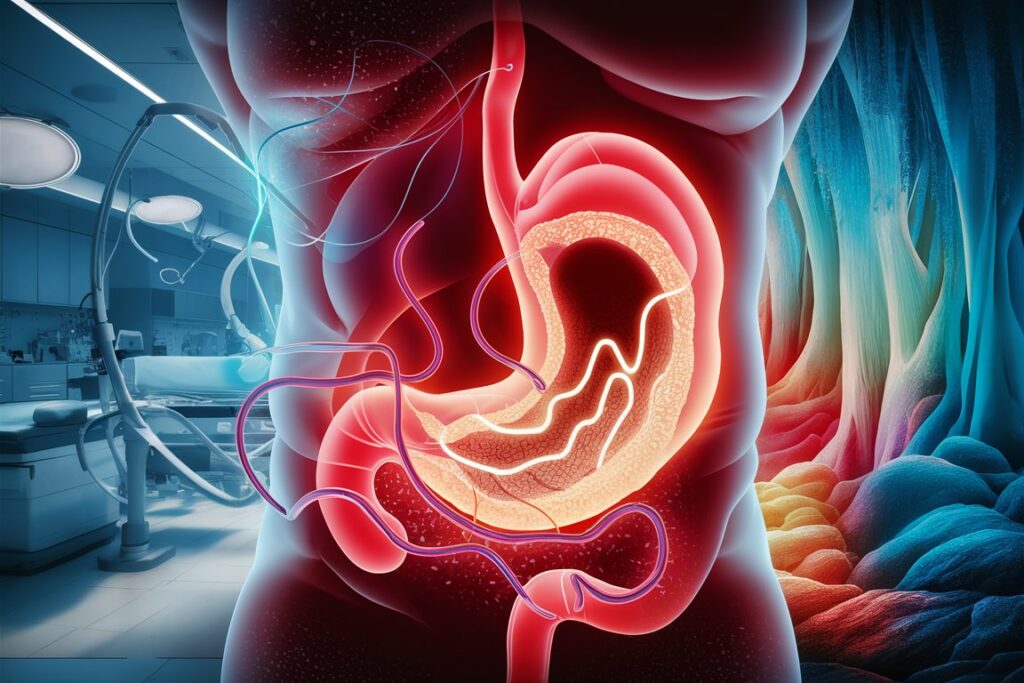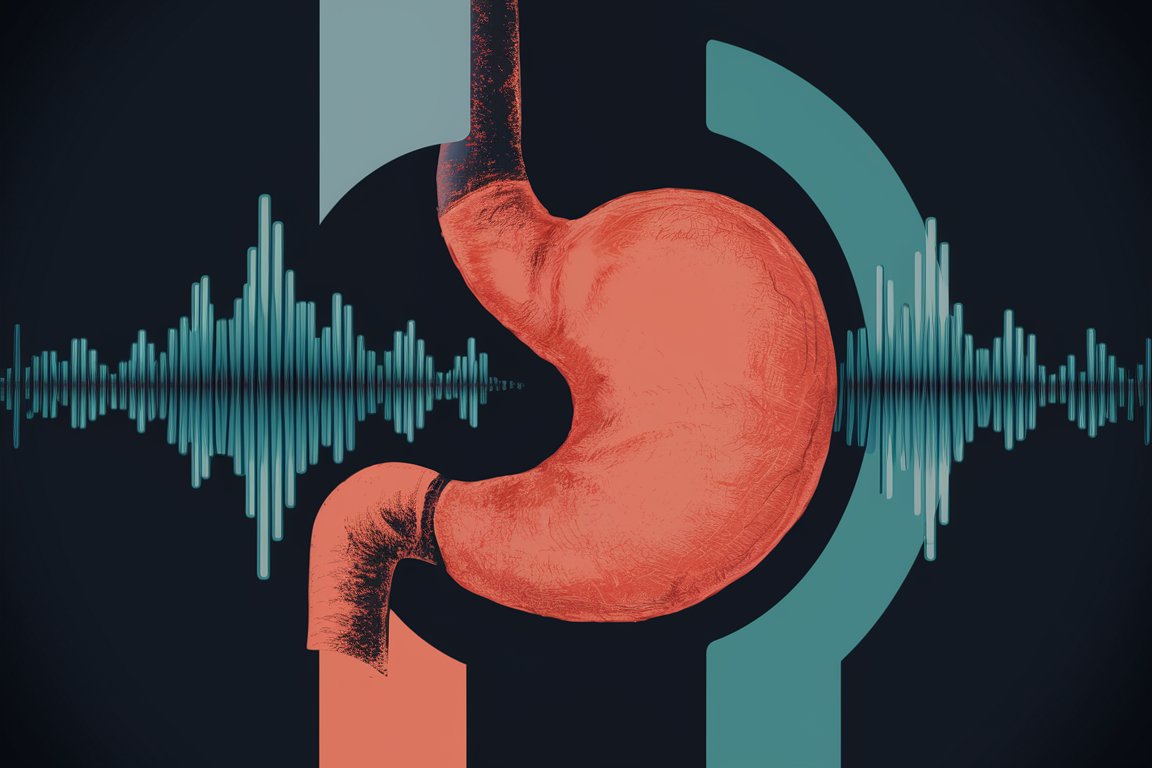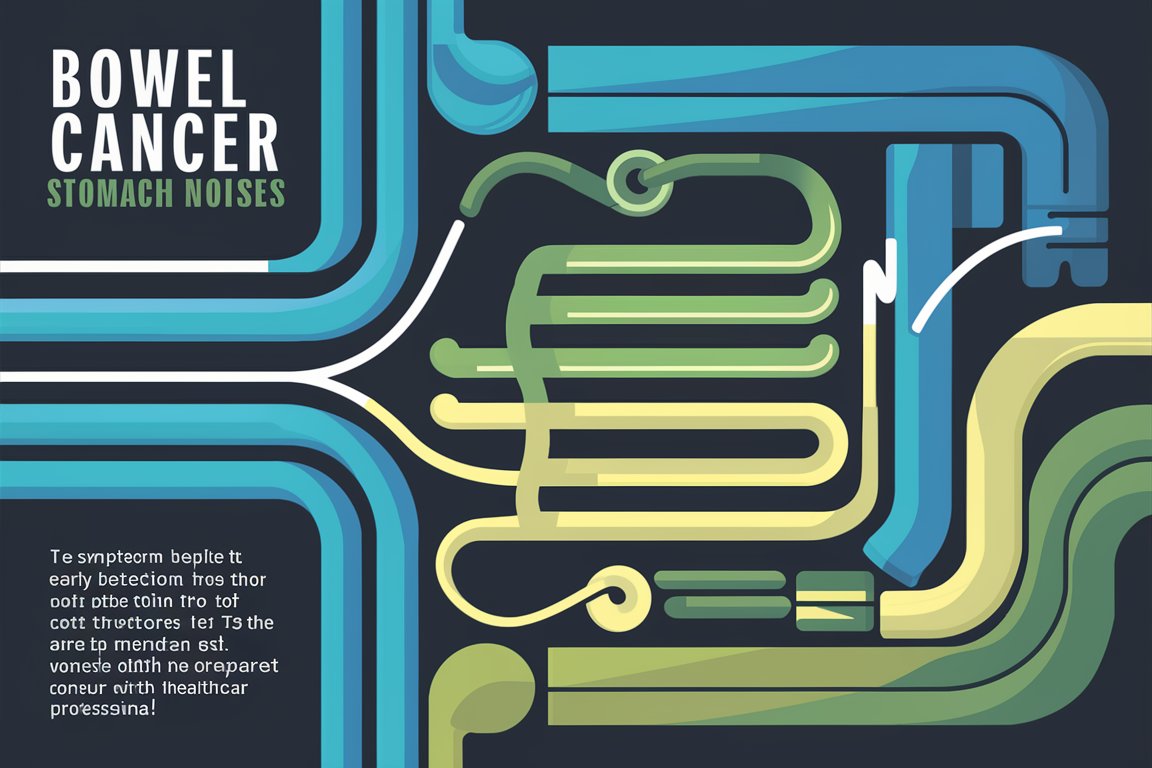Bowel Cancer Stomach Noises originating from the abdomen are normal and mostly harmless. However, when coupled with other signs, they may point to health issues, such as bowel cancer.
Recognizing when to pay attention to these sounds and seeking medical care can make a big difference. This article explores the relationship between bowel cancer and tummy noises, potential symptoms to monitor for, and steps one can take for prevention and treatment.

What Triggers Stomach Noises?
Generally, abdominal sounds (scientifically called borborygmi) occur as the digestive system performs its duties. These sounds materialize when foods, liquids, and air move through the intestines. They’re an ordinary part of processing nourishment and usually nothing to worry about.
Nevertheless, abnormal or constant stomach noises sometimes indicate gastrointestinal (GI) problems. Conditions like irritable bowel syndrome (IBS), food sensitivities, or bowel cancer may be connected to these unusual noises, especially accompanied by other signs.
Understanding what’s typical and what isn’t, one can better determine when to consult a healthcare professional.
What Is Bowel Cancer?
Bowel cancer, often known as colorectal cancer, arises in the colon or rectum. It arises when normal cells lining the bowel multiply uncontrollably, forming tumors. Bowel cancer is among the most common cancer types globally, and early detection can significantly improve outcomes.
Key Risk Factors for bowel cancer
While the precise cause of bowel cancer isn’t always known, several variables can boost risk, like:
- Age: (most cases occur in those over 50)
- Family History: of bowel or related cancers
- Lifestyle: factors like poor diet, smoking, and lack of exercise
- Pre-existing conditions: including inflammatory bowel disease (IBD)
- The Link Between Bowel Cancer and Digestive Distress
Can Abdominal Sounds Signal Colon Malignancy?
Gingival gurgles are usually benign on their own. However, they warrant attention when combined with issues like:
- Bloating
- Changes in bowel movements
- Unexplained weight loss
- Blood in stool
Tumors developing in the colon can disrupt typical gastrointestinal functioning. Growths may create partial obstructions, stalling digestion, amplifying rumblings, or loud stomach noises. Additionally, these noises are sometimes accompanied by a sense of discomfort or pain.
It is prudent to heed persistent or peculiar bowel cancer stomach noises, especially paired with concerning signs. Medical evaluation is advisable.

Symptoms of Bowel Cancer Worth Watching
Early identification is essential. Key indicators include:
- Altered Bowel Habits: Frequency, firmness, or shape changes to stool (e.g., diarrhea, constipation, or narrower than usual) raise suspicion.
- Blood in Stool: This may appear as bright red blood or black, tar-like stool.
- Persistent Abdominal Pain: Cramping, bloating, or relentless pain may indicate an intestinal blockage.
- Fatigue and Lethargy: These often stem from anemia caused by chronic bleeding.
- Unexplained Weight Loss: Rapid weight loss without dietary or activity changes warrants attention.
Stomach noises alone do not equate to bowel cancer but should not be dismissed when accompanied by these signs.
Seeking Medical Guidance for Bowel Cancer
When Professional Insight is Prudent
If digestive distress, abnormal bowel movements, or any listed symptoms persist, see a healthcare provider promptly. Early diagnosis increases the odds of treatment success.
Potential Diagnostic Steps After consultation, a provider may recommend:
- Physical Examination: While early detection is key, examination aims to illuminate abnormalities hiding within.
- Probing Further: To ferret out microscopic traces indicating harm underway, physicians analyze evacuations for hidden hints.
- A Closer Inspection: Colonoscopy offers ocular access to every contour and crevice, armed with an elongated eye permitting scrutiny from within.
- Deeper Investigation: Computerized tomography scans or magnetic resonance imaging delve deeper, gauging the gravity of the issue from without.
- Speeding Diagnosis: Expeditious diagnosis exponentially elevates the chances of successful remedy and reclamation.
Forestalling Bowel Cancer
While risks like era or genes defy modification, confident choices curb colon carcinoma chances.
- A Diet for Health: Focusing on an aliment rich in fruits, veggies, whole grains, and lean proteins yet lightweight on processed meats is linked to higher jeopardy. Fiber plays a pivotal role in colon wellness.
- Motion is Medicine: Consistent exercise maintains a balanced burden, a paramount factor in reducing cancer risks.
- Avoiding Hazards: Both smoking and overindulging in spirits spike susceptibility to several cancers, including colon.
- Regular Screenings: For folks over fifty or at augmented peril, screening is the most intelligent way to detect colon cancer at its earliest and most treatable stage via colonoscopies or fecal immunochemical tests.

Coping with the Diagnosis
If bowel cancer has touched your life, understand you need not face it alone help from others eases the process.
Treatment Options
Surgery: Extraction of malignant tissue usually initiates remedy.
Chemotherapy and Radiation: These therapies complement surgical removal or stand-alone.
Targeted Therapies: Progress has produced treatments exclusively homing in on cancer cells, sparing wholesome tissue harm.
Emotional Support
Digesting a bowel cancer diagnosis can be emotionally distressing. Connecting with support circles, therapists, or counselors provides a protected place to process sentiments and share encounters.
Final Thoughts Bowel Cancer and Abdominal Sounds
While abdominal sounds alone are usually ordinary, they sometimes may signify more substantial health issues when joined with other indications. Being proactive and noticing your body is essential to quickly catching problems like bowel cancer.
If you’ve been experiencing persistent bowel cancer stomach sounds, along with variations in your digestive well-being, don’t postpone schedule an assessment with your healthcare provider immediately.
Your wellness is your most important possession, and knowledge is a powerful instrument for deterrence and care. Take the necessary steps to ensure your digestive health stays robust.
Risk Factors for Bowel Cancer What You Should Know
Risk factors for bowel cancer come in many forms, both within and beyond our control. While genetics and age increase the odds for some, lifestyle choices also impact one’s vulnerability. Understanding all contributing elements, people can make informed decisions to safeguard their wellness best.
Certain inherent aspects heighten the chance of bowel cancer like a family history dotted with the disease or other digestive issues. Conditions like inflammatory bowel disease escalates risk, so those affected warrant added vigilance.
Advancing years compound the threat, though bowel cancer can strike at any age that’s why regular screening holds significance, especially after 50.
Dietary and physical habits also correlate with bowel cancer risk. Heavy consumption of processed or red meats correlates with a greater likelihood, as does a dearth of fiber. Similarly, sedentary routines correlate with many health harms, including heightened bowel cancer risk.
Excess weight constitutes another marked factor, demonstrating the preventative power of balanced eating and physical activity.
Long-term practices like smoking and overindulging in alcohol are directly associated with bowel cancer incidence. Avoiding such behaviors fosters overall wellness and lowers cancer susceptibility.
Understanding contributing elements can pinpoint areas for beneficial modification or added preventative steps. Consulting medical experts about personalized risk factors constitutes an essential move toward protection.
Less discussed yet still important is how bowel cancer may manifest through stomach noises. Subtle alterations in digestive sounds sometimes foreshadow bowel cancer and should not be ignored.
This comprehensive guide explores the potential connection between bowel cancer and stomach noises, key symptoms to watch for, causes of shifts in gut health, and the importance of swift diagnosis.
Grasping this relationship allows proactive wellness protection through attentiveness to body signals and a willingness to act on changes.

What is Bowel Cancer?
Bowel cancer initiates as abnormal cells rapidly multiply uncontrolled within the walls of the extensive intestine or rectum. While it can influence individuals of any age, it’s more widespread in individuals aged 50 and older.
Risk elements incorporate a family ancestry of bowel cancer, way of life choices (like a low-fiber eating regimen and lack of workout), and preexisting bowel conditions like inflammatory bowel disease (IBD).
Some common signs include:
- persistent adjustments in bowel behaviors (diarrhea or bowel obstruction)
- bloodstream in the stool
- abdominal discomfort and puffiness
- unexplained weight reduction
Curiously, unusual abdomen noises such as gurgling, rumbling, or high-pitched seems may also be connected to bowel cancer. But exactly what precisely causes these noises, and should they worry you?
Stomach Noises Explained The Fundamentals
Stomach noises, clinically described as borborygmi, are sounds generated by the gastrointestinal (GI) tract as an element of the digestive function procedure. The GI tract involves the abdomen and intestines, and these noises occur when food, fluid, and air transfer via the digestive system.
Regular belly noises typically tumble into the following types:
- Hunger-Related Sounds: When your abdomen is clear, hormone signals trigger rhythmic muscle tissue contractions, generating gurgling.
- Digestive Noises: Following eating, your digestive system works actively to break down foodstuffs, occasionally to sloshing and rumbling noises.
- Gas-Related Noises: Launching gas from bacterial fermentation in the intestines can occasionally result in louder-than-usual noises.
Nevertheless, continual or unusual abdomen noises could indicate an underlying concern, like bowel cancer.

When Do Stomach Noises Indicate a Bigger Problem?
While stomach noises are generally harmless, they may provide an early warning when partnered with other signs of bowel cancer. Persistent gurgling or rumbling that don’t dissipate, especially if combined with the following, warrant further exploration:
- Blood in your stool
- Frequent abdominal soreness
- Bloating or feeling replete hastily after eating
- Alteration in stool texture or form (thin, ribbon-like stools)
- Unintended weight reduction or weariness
Why Might Bowel Cancer Cause Stomach Noises?
- Tumor-related Clogs: Growth in the bowel can partly obstruct the transit of food and gas, causing high-pitched or irregular noises as the contents attempt to pass through.
- Irritated Intestinal Walls: Bowel cancer can cause the stomach lining to bulge. This irritation may alter how your intestines process nourishment, producing unusual sounds.
- Excessive Gas Formation: Changes in gut microbes or digestion due to the cancer’s impact can lead to increased gas, which could produce louder noises.
Early detection is pivotal. Recognizing these changes and stomach noises could lead to timely diagnosis and treatment.
Common Misconceptions about Stomach Noises
- “All Stomach Noises Are Related to Hunger”: Not every gurgle means you’re hungry. Persistent and unusual noises may signal digestive disturbances or even bowel cancer.
- “Loud Stomach Noises Always Indicate a Problem”: Not every loud noise is a cause for concern; noises may be part of normal digestion.
- “Stomach Noises and Pain Guarantee Cancer”: Abdominal noises combined with pain don’t necessarily mean you have bowel cancer. They could indicate other conditions like irritable bowel syndrome (IBS), lactose intolerance, or celiac disease.
Knowing the distinctions can help determine whether stomach noises are routine or require medical attention.
Diagnosing Colorectal Cancer
- Persistent stomach noises accompanied by other potential symptoms merit prompt medical attention. Standard diagnostic evaluations for colorectal cancer incorporate.
- Physical Examination: Abdominal palpation hunts for irregular masses or sensitivities.
- Fecal Occult Blood Test (FOBT): This screen detects inconspicuous blood in stool, an early possible sign of colorectal cancer.
- Colonoscopy: Colonoscopy allows visualization of the interior of the large intestine to search for polyps or tumors.
- Imaging Tests: CT scans and MRIs aid identification of tumors or aberrant growth in the colon or rectum.

Potential Treatments for Colorectal Cancer
Therapy relies on the stage and severity. Alternatives include:
- Surgery: Extracting the tumor and impacted sections of the bowel is commonly the first choice.
- Chemotherapy: This uses medications to kill cancer cells and shrink tumors.
- Radiation Therapy: High-energy beams can focus on distinct cancerous developments.
- Targeted Therapy: Medications like Avastin or cetuximab may prevent the advancement of new blood vessels feeding tumors.
With timely intervention, the prognosis for colorectal cancer can be vastly improved.
Preventing Colorectal Cancer and Unusual Stomach Noises
While not all cases can be avoided, adopting a healthier lifestyle can decrease your risk. Here are some strategies:
- Consume a High-Fiber Diet: Include more fruits, vegetables, and whole grains to promote balanced digestion.
- Limiting Red and Processed Meat Consumption: A diet high in these foods has long been suspected to heighten bowel cancer risk. Staying mindful of portion sizes is prudent.
- Physically Active Lifestyles: Regular exercise helps facilitate bowel movements and reduces internal swelling. Even light activities like walking provide benefits.
- Saying Goodbye to Smoking and Drinking in Moderation: Both smoking and overindulging in alcohol are suspected culprits that may elevate bowel cancer risk over time. Knowing your limits is wise.
- Routine Screenings from an Early Age: If you have a family history or are middle-aged, consistent colonoscopy checks could help catch any growths while they are still small. Early detection often enables less invasive treatment and higher chances of remission. Paired with vigilance for atypical digestive noises or patterns, screening offers peace of mind.
- Staying Hydrated is Key: Drinking plenty of water supports smoother digestion and lessens the likelihood of blockages that could result in strange abdominal sounds. Water is one of our best natural allies for gut health.
- Holistic Wellness Maximizes Protection: Adopting healthy lifestyle habits offers the best defense against bowel cancer risk. Mind and body thrive when cared for comprehensively through nutrition, activity, social ties, stress relief, and medical guidance.
- Unusual Noises Warrant Examination: Ignoring odd stomach noises risks dismissing potential issues needing care. While these alone don’t signify disease, seeing your provider ensures thorough evaluation, mainly if other red flags exist. Prevention is always preferable to late intervention.
Pancreatic cancer stomach noises
In patients with pancreatic cancer, stomach noises may happen for different reasons. As the cancer advances, it can disrupt the usual digestive process, causing bloating, gas or indigestion that may produce audible stomach sounds.
Also, the tumor can block the intestines or interfere with the pancreas’s ability to produce enzymes needed for digestion, worsening these symptoms.
Chemotherapy, a treatment side effect, can also interfere with digestion, leading to louder stomach noises. These sounds could indicate gastrointestinal distress or complications.
Gastritis stomach noises
In people with gastritis, stomach lining inflammation often causes stomach noises. This can cause an imbalance in stomach acid production, leading to gas, cramping, or indigestion, which creates noise.
Irritation can also prevent the stomach from properly digesting food, resulting in increased air or fluid in the digestive system and producing gurgling or rumbling sounds. Other gastritis symptoms, such as nausea or discomfort, can accompany these.
Conclusion
Digestive noises and bowel cancer may connect more often than assumed. Awareness of your body’s signals and discussing any changes promptly with a doctor supports early diagnosis and improved outcomes.
Holistic lifestyle choices that honor gut health yield benefits across one’s lifespan. If something seems amiss downstairs, prioritize addressing it without delay.
<script type="application/ld+json">
{
"@context": "https://schema.org",
"@type": "Article",
"mainEntityOfPage": {
"@type": "WebPage",
"@id": "https://skyhealthnews.com/bowel-cancer-stomach-noises/"
},
"headline": "Bowel Cancer Stomach Noises",
"description": "Bowel Cancer Stomach Noises originating from the abdomen are normal and mostly harmless. However, when coupled with other signs, they may point to health issues, such as bowel cancer.",
"image": "https://skyhealthnews.com/wp-content/uploads/2025/01/Bowel-Cancer-Stomach-Noises-1024x683.jpeg",
"author": {
"@type": "Person",
"name": "Farhad",
"url": "https://skyhealthnews.com/author/farhad"
},
"publisher": {
"@type": "Organization",
"name": "",
"logo": {
"@type": "ImageObject",
"url": ""
}
},
"datePublished": "2025-01-17"
}
</script>








